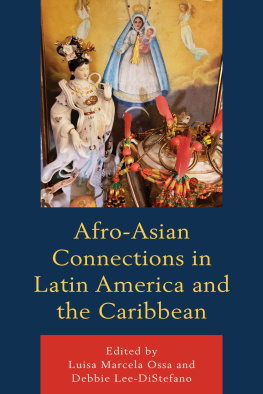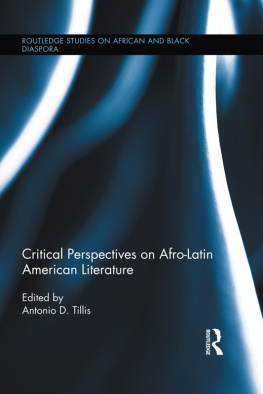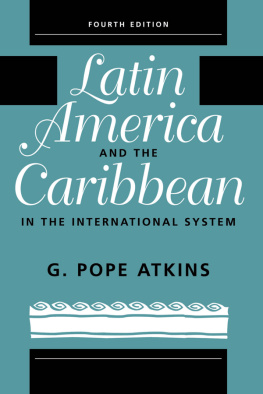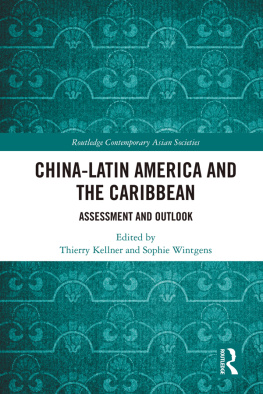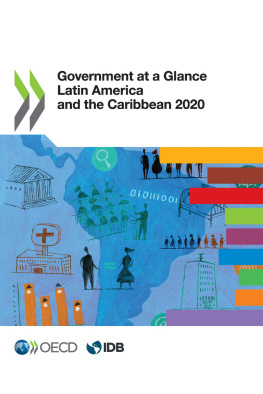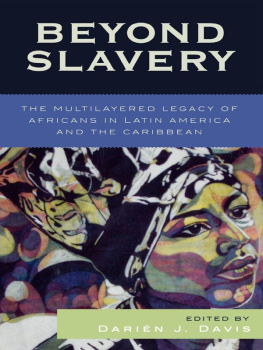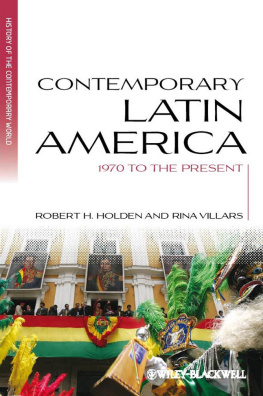
Rewriting the African Diaspora in Latin America and the Caribbean
This volume considers the African Diaspora through the underexplored Afro-Latino experience in the Caribbean and South America. Utilizing both established and emerging approaches such as feminism and Atlantic studies, the authors explore the production of historical and contemporary identities and cultural practices within and beyond the boundaries of the nation-state.
Rewriting the African Diaspora in Latin America and the Caribbean illustrates how far the fields of Afro-Latino and African Diaspora studies have advanced beyond the Herskovits and Frazier debates of the 1940s. The books arguments complicate Herskovits insistence on Black culture being an exclusive reflection of African survivals, as well as Fraziers counter-claim of African American culture being a result of slavery and colonialism. This collection of thought-provoking essays extends the concepts of diaspora and transnationalism, forcing the reader to reassess their present limitations as interpretive tools. In the process, Afro-Latinos are rendered visible as national actors and transnational citizens.
This book was originally published as a special issue of African and Black Diaspora.
Robert Lee Adams Jr, Ph.D. is an independent researcher and consultant. He previously served as Chief Operating Officer at the Martin Luther King, Jr. Center for Nonviolent Social Change in Atlanta, USA, and as a Program Officer at The Fetzer Institute in Michigan. In 2008, Dr. Adams was a Fulbright Visiting Professor at the Catholic University of So Paulo, Brazil.
Rewriting the African Diaspora in Latin America and the Caribbean
Beyond Disciplinary and National Boundaries
Edited by
Robert Lee Adams Jr
First published 2013
by Routledge
2 Park Square, Milton Park, Abingdon, Oxon, OX14 4RN
Simultaneously published in the USA and Canada
by Routledge
711 Third Avenue, New York, NY 10017
Routledge is an imprint of the Taylor & Francis Group, an informa business
2013 Taylor & Francis
This book is a reproduction of African and Black Diaspora: An International Journal, volume 5, issue 1. The Publisher requests to those authors who may be citing this book to state, also, the bibliographical details of the special issue on which the book was based.
All rights reserved. No part of this book may be reprinted or reproduced or utilised in any form or by any electronic, mechanical, or other means, now known or hereafter invented, including photocopying and recording, or in any information storage or retrieval system, without permission in writing from the publishers.
Trademark notice: Product or corporate names may be trademarks or registered trademarks, and are used only for identification and explanation without intent to infringe.
British Library Cataloguing in Publication Data
A catalogue record for this book is available from the British Library
ISBN13: 978-0-415-65975-8
Typeset in Times New Roman
by Taylor & Francis Books
Publishers Note
The publisher would like to make readers aware that the chapters in this book may be referred to as articles as they are identical to the articles published in the special issue. The publisher accepts responsibility for any inconsistencies that may have arisen in the course of preparing this volume for print.
Contents
Fassil Demissie
Robert Lee Adams Jr
Nathaniel Millett
Mark Anderson
Vaniclia Silva Santos
Melina Pappademos
Ivor L. Miller
Andrea Queeley
Kimberly Eison Simmons
Keisha-Khan Y. Perry
Robert Lee Adams Jr
The following chapters were originally published in African and Black Diaspora: An International Journal, volume 5, issue 1 (January 2012). When citing this material, please use the original page numbering for each article, as follows:
Chapter 1
Rewriting the African Diaspora in the Caribbean and Latin America: beyond disciplinary and national boundaries
Robert Lee Adams Jr
African and Black Diaspora: An International Journal, volume 5, issue 1 (January 2012)
pp. 3-20
Chapter 2
An analysis of the role of the study of the African Diaspora within the field of Atlantic history
Nathaniel Millett
African and Black Diaspora: An International Journal, volume 5, issue 1 (January 2012)
pp. 21-33
Chapter 3
Comparison and connection in the study of Afro-Latin America
Mark Anderson
African and Black Diaspora: An International Journal, volume 5, issue 1 (January 2012)
pp. 35-48
Chapter 4
Africans, Afro-Brazilians and Afro-Portuguese in the Iberian Inquisition in the seventeenth and eighteenth centuries
Vaniclia Silva Santos
African and Black Diaspora: An International Journal, volume 5, issue 1 (January 2012)
pp. 49-63
Chapter 5
Political chang: race, political culture, and black civic activism in the early Cuban republic
Melina Pappademos
African and Black Diaspora: An International Journal, volume 5, issue 1 (January 2012)
pp. 65-84
Chapter 6
Bong It: leopard society music and language in West Africa, Western Cuba, and New York City
Ivor L. Miller
African and Black Diaspora: An International Journal, volume 5, issue 1 (January 2012)
pp. 85-103
Chapter 7
El Puente: transnationalism among Cubans of English-speaking Caribbean descent
Andrea Queeley
African and Black Diaspora: An International Journal, volume 5, issue 1 (January 2012)
pp. 105-122
Chapter 8
Constructing and promoting African Diaspora identity in the Dominican Republic: the emergence of Casa de la Identidad de las Mujeres Afro
Kimberly Eison Simmons
African and Black Diaspora: An International Journal, volume 5, issue 1 (January 2012)
pp. 123-133
Chapter 9
State violence and the ethnographic encounter: feminist research and racial embodiment
Keisha-Khan Y. Perry
African and Black Diaspora: An International Journal, volume 5, issue 1 (January 2012)
pp. 135-154
Foreword
Fassil Demissie
DePaul University, USA
Over a half century after Melville Herskovits published his ground breaking study on The Myth of the Negro Past (1941), anthropologist James Clifford in his often cited article Diasporas, posed the probing question, What is at stake, politically and intellectually, in contemporary invocations of diaspora? (1994, p. 302). This is as pivotal a question today as it was then, as scholars explore the link between and among the people of African descent in Latin America and the Caribbean.
The concept of diaspora has been associated with historical events of forced migration or dispersal whose profound effects have become inscribed in narratives of dislocation. As a specific historical and contested process embedded in a set of cultural and social relations across time and space, the concept of diaspora, as Avtar Brah (1996) reminds us, is not limited to a historical experience. Rather, it functions both as a theoretical concept and a complex analytic discourse. Indeed, Brah contends that we conceive of diasporas as an ensemble of investigative technologies that historicize trajectories of different diasporas, and analyse their relationality across fields of social relations, subjectivity and identity (1996, p. 177).




